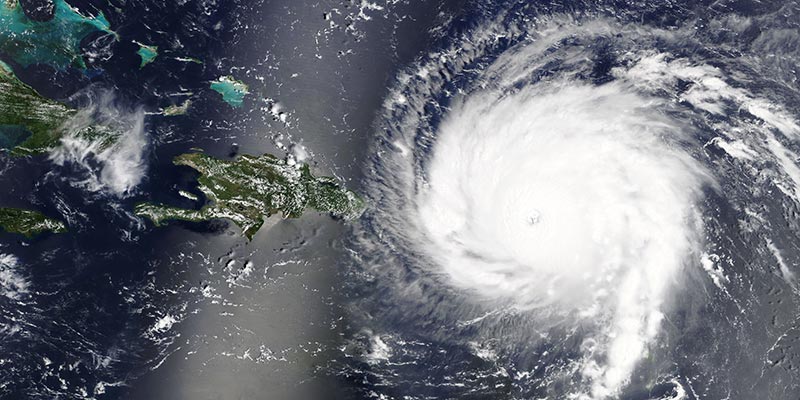Blog: Tackling climate change in the Caribbean
Posted on Monday 4 October 2021

Caribbean Small Island Developing States (SIDS) generate only 0.36 per cent of global greenhouse gas emissions yet are among the nations in the world that suffer most from global warming (Bárcena et al. 2020: 129). Caribbean SIDS have long raised concerns about the challenges they face resulting from climate change, including their ability to achieve the Sustainable Development Goals (SDGs). COP26 offers them an opportunity to ask major emitters to contribute to their efforts to adapt to and mitigate the impact of climate change.
Leaders’ Declaration
On 22 September, on the margins of the 76th session of the United Nations General Assembly, the Alliance of Small Islands (AOSIS), which includes many Caribbean SIDS, issued a Leaders’ Declaration which largely focuses on climate change and sets out some of the issues they wish to see raised at COP26.
The Declaration mentions that the subsidising of the fossil industry by major emitters runs counter to the Paris Agreement and urges the G20 to phase these out by 2023 while at the same time increasing their subsidies for renewables. More specifically it highlights the global inequality in climate finance – SIDS receive only 2 per cent of climate finance under the United Nations Framework Convention on Climate Change (UNFCCC) and half of this is in loans. But not only do Caribbean SIDS not have adequate access to funding, they also endure a complicated process of application.
Scale up support
The Declaration therefore urges COP26 to discuss ways to scale up ‘adequate, predictable and long-term support from the international community’ to enable SIDS to adapt to and mitigate the impact of climate change.
Following the declaration, individual leaders issued calls for enhanced solidarity and action from the international community. The Prime Minister of Jamaica, Andrew Holness, said it was “imperative that, as SIDS, we are able to invest in the resilience of our economies to climate change and other external shocks. Consequently, the COP26 discussions must be action-oriented and serve to focus our attention on fiscal space and debt sustainability in SIDS, alongside climate finance commitments.” (AOSIS)
By demanding that SIDS, which are disproportionately affected by climate change, receive a higher share of climate finance, the Leaders’ Declaration frames climate change as a rights issue.
Climate justice
But climate justice is not just about the inequitable impact of climate change on different places. The effects of climate change in Caribbean SIDS are felt unevenly. The poor, the elderly, racial and ethnic minorities, migrants, and other vulnerable groups are most at risk from climate change because of where they live and their lack of power to influence policy making. They also have the least capacity and resources to respond to climate change.
My research examines the uneven effects of climate change in Caribbean SIDS from the end of the Second World War, when islands started to industrialise, develop their tourist industry, and modernise agriculture, to the present when they face some of the most severe consequences of climate change, including sea level rise, and more frequent and more intense storms, droughts, and floods.
But my research is also concerned with the fairness of policies and practices adopted by Caribbean SIDS to address climate change and its consequences. Tourist areas, for instance, often witness more investment to adapt to climate change than other areas, and within urban areas well-off neighbourhoods are often prioritised. For example, when the National Solid Waste Management Agency (NSWMA) in Jamaica recently decided to pilot a scheme to collect plastic bottles, it selected the most affluent areas in Kingston, while people in low-income neighbourhoods in the city are often forced to burn their plastic and other waste because of poor or absent waste collection.
Indebted nations
I hope that at COP26, the major emitters will heed the various requests made in the Leaders’ Declaration, especially the demand to make more climate finance available for SIDS and which is cheaper and easier to obtain. Caribbean SIDS are among the most indebted nations in the world. Because of their location and climate vulnerability, they frequently experience natural disasters that cause damage that significantly affects their GDP, and this in turn impacts their ability to build resilience.
The Economic Commission for Latin America and the Caribbean (ECLAC) has long advocated a ‘debt for climate adaptation swap’ initiative that would offer relief to Caribbean economies overburdened by public debt while directing resources for investment in climate adaptation projects to build resilience. While I hope that COP26 will seriously consider this and other initiatives to enhance climate finance for Caribbean SIDS, I also hope that it will discuss ways to ensure that climate mitigation and adaptation policies and practices will not reinforce existing inequalities whether at the global or at the national level.
The text of this article is licensed under a Creative Commons Licence. You're free to republish it, as long as you link back to this page and credit us.

Henrice Altink
Henrice is Professor in Modern History and Co-Director of the Interdisciplinary Global Development Centre (IGDC). Her main research focuses on social inequalities in the Caribbean.
